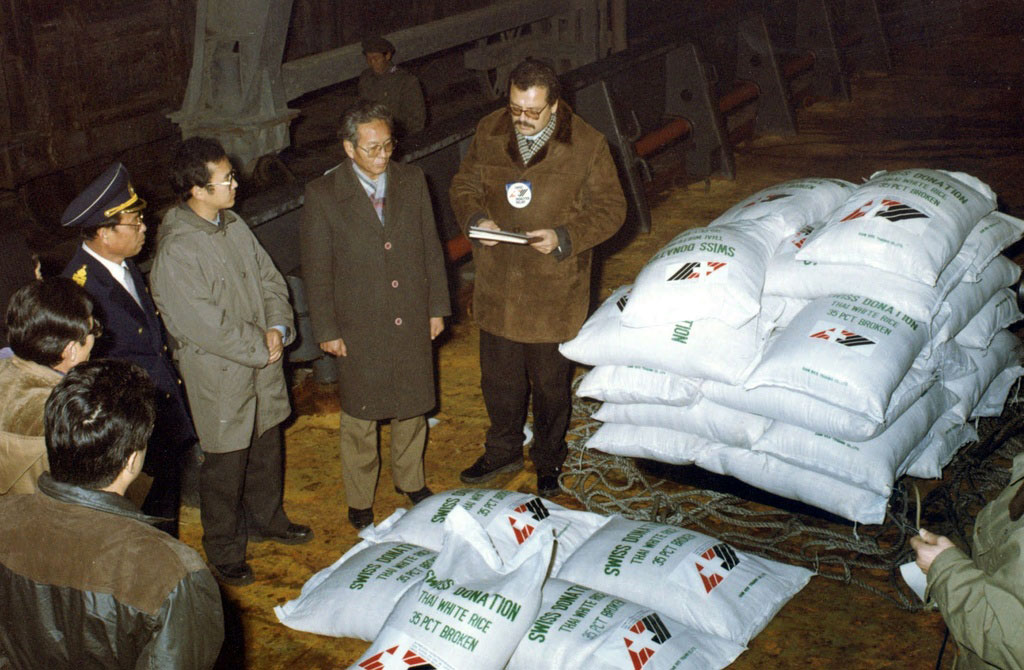
No Swiss rethink on ending aid to North Korea

Switzerland is standing by a decision to stop development aid to North Korea, which has focused on improving food security in the internationally isolated country.
The foreign ministry says it now has a strategy for the withdrawal of Swiss development workers from the communist country by the end of 2011.
In 2008 the government approved a motion by parliamentarian Gerhard Pfister demanding a halt to development aid in response to North Korea’s continuing nuclear ambitions.
“The atomic weapon programme violates international agreements. North Korea has shown itself to be utterly uncooperative, despite international efforts. It threatens to destabilise the region,” the motion said.
Although Switzerland has no official representation in the communist country, diplomatic relations were established in 1974.
The Swiss Agency for Development and Cooperation (SDC) has had an office in the capital, Pyongyang, since 1997. According to the motion, the SDC justified its work there by saying that “supporting the reform process” should improve food security. The SDC cited a “tentative opening” of the country as a success.
Pfister maintains that today North Korea is no longer showing a “tentative opening” – rather the opposite.
The SDC’s main priority in the country has been aid projects aimed at improving the efficiency and sustainability of North Korean agriculture.
Consistent policy?
The central question is whether it is wiser to isolate a totalitarian regime or to cooperate with it. The attitude of the Swiss parliament and government is clear: stop development aid.
But is the issue simply black and white? On December 21 Switzerland celebrated – in the presence of the North Korean foreign minister – the 35th anniversary of diplomatic relations.
On December 28 Blaise Godet, the Beijing-based Swiss diplomat responsible for North Korea, told the Neue Zürcher Zeitung that Switzerland had nurtured a consistent policy of engagement and political dialogue. “We want to contribute to solutions,” he said.
As for the ending of aid at the end of 2011, foreign ministry spokesman Erik Reumann told swissinfo.ch that “the SDC would follow the decision of the government and parliament. A dismantling plan exists that will guarantee a well-organised withdrawal from North Korea”.
Similarities with Switzerland
While the Swiss government and parliament want to end development aid to North Korea, former justice minister Christoph Blocher, a leading figure in the rightwing Swiss People’s Party, has written in detail about his visit to the country – on a hiking holiday.
The self-confessed anti-communist noted in the Weltwoche weekly magazine in November that “one thing North Korea and Switzerland have in common is that both countries want to keep their autonomy and are working for a safe future”.
In Pyongyang Blocher said he came across “normal conditions”, but admitted that “we only had access to those areas and streets considered presentable”. Nevertheless, he continued, “the streets are tidy and the Korean people are all clean and decently dressed, and go everywhere on foot. People walk”.
But Blocher agreed that the food situation was unsatisfactory.
The United Nations World Food Programme estimates that 37 per cent of the 24 million inhabitants have acute problems getting enough to eat, adding that food rations are nowhere near adequate.
Jean-Michel Berthoud, swissinfo.ch (Adapted from German by Thomas Stephens)
Switzerland, along with Sweden, is a member of the supervisory commission which ensures compliance with the armistice between the two Koreas.
In the wake of the famine of the 1990s, Switzerland was one of the first to offer humanitarian aid.
And almost alone among donors, it subsequently turned its humanitarian commitment into a long-term development programme. The programme is run by the Swiss Agency for Development and Cooperation.
Much of the programme is specifically geared to improving agricultural output, but it is also aimed at integrating North Korea into the international community.
Swiss cooperation has been strongly criticised in parliament, and is to end after 2011.
Kim Jong-il’s third son, Kim Jong-un, whom many observers think will succeed his father, spent some of his teenage years at school near Bern.

In compliance with the JTI standards
More: SWI swissinfo.ch certified by the Journalism Trust Initiative


























You can find an overview of ongoing debates with our journalists here . Please join us!
If you want to start a conversation about a topic raised in this article or want to report factual errors, email us at english@swissinfo.ch.